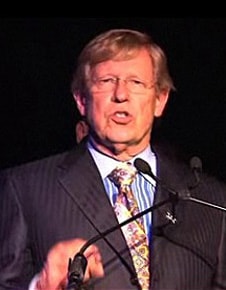Is this even a matter for a federal court?
Of course it is. State laws can violate the federal constitution. But back in 1971, it wasn't. The U.S. Supreme Court's refusal to hear a case called Baker v. Nelson, a marriage ban challenge, for "lack of a federal question," is constantly raised by marriage equality opponents. To them, the Baker v. Nelson case means that the challenge should the thrown out. Not true. Judge Wright Allen quoted Windsor, Romer, and even Judge Shelby's decision declaring Utah's marriage ban unconstitutional to prove that much has changed since 1971. Since then, gays not only stopped being presumptive criminals under the law, but also received protected status under Lawrence and Windsor.
 Does marriage discrimination violate the Due Process Clause?
Does marriage discrimination violate the Due Process Clause?
Yes. Back in 2012, when Ted Olson and David Boies were arguing the Prop 8 case, Olson made a point of saying that "the Supreme Court has stated fourteen times that marriage is a fundamental right." Judge Wright Allen recounted most of those times in her decision, arguing that all the plaintiffs wanted to do was be able to join this important and essential institution. Notably, she concluded that they did not want to create a new right — a right to same-sex marriage — but just to exercise an existing right — a right to marry — like everyone else.
Plaintiffs are not, as one of the defendants tried to argue, suggesting that "mothers and fathers [do not] matter." Judge Wright Allen had little patience for this argument. It relied, she said, on outdated stereotypes that you need one man and one woman to have a good family. In fact, you need two loving parents, of whatever gender, and we have countless studies to prove she is correct.
States cannot restrict fundamental rights, which are rights so important to what it means to be an American, unless they provide a "compelling interest" and "narrowly tailor" their actions to result in the least restriction possible. That is strict scrutiny, and Virginia's arguments could not even come close.
Tradition could not do it. Just because Virginia has traditionally restricted marriage to opposite-sex couples, that does not mean that tradition should be revered above all else. Indeed, the legal, political, and social context has changed also so dramatically over the last 50 years that Virginia's traditions have changed.
Federalism could not do it, either. Sure, Virginia should have the power to regulate its marriage laws, but that power cannot exceed the powers granted to the states in the Constitution. That is, the states cannot violate the law of the land even while regulating an area of law normally left to state governments.
Does marriage discrimination violate the Equal Protection Clause?
Yes. Up until this point in Judge Wright Allen's decision, she relied exclusively on the Due Process Clause. There is something to this: Judge Kennedy's decisions in Romer and Lawrence and even Windsor, to some extent, have all been due process cases. But relying on strict scrutiny has not been Kennedy's tradition, so it may not have been the most successful strategy to rely on that alone.
Here enters the fact that banning gays from marrying discriminates and violates equal protection. And for this section, the judge did not need to rely on heightened or strict scrutiny; rather, the ban failed even under rational basis. That is, there is no rational reason to restrict gays from marrying in Virginia. Gay couples are just like opposite-sex couples and no justification offered by the state made sense. Moral condemnation of homosexuality is not, and is never, enough. The desire to promote "responsible procreation" is not enough, either: Just because heterosexuals can accidentally have children is no reason to prevent gays from joining the institution of marriage. If anything, it is a reason to encourage heterosexuals to marry!
But this part of the decision took only a few pages. We see clearly where Judge Wright Allen's true sympathies lie: marriage is a fundamental right and bans on same-sex marriage interfere with that right. Period.
What happens next?
The order to allow gays to marry in Virginia was stayed given that the Supreme Court stayed the orders in Utah and orders have been stayed elsewhere. You may recall that the Commonwealth of Virginia declined to participate in this case anymore after the election of a Democratic governor and attorney general. But a county clerk is still a party to this lawsuit, which would allow him, defended by a far right legal organization, to appeal the decision up to the Fourth Circuit and then, perhaps, to the Supreme Court.
The Supreme Court may indeed rule on this case eventually. In fact, a ruling might be forced upon the justices. Marriage equality cases were just filed in Louisiana and Texas, both part of the deeply conservative Fifth Circuit. If a decision at that appellate court upholds marriage discrimination, then there would be a split among the circuits, assuming we also get an appellate court to reject marriage discrimination either in the Fourth Circuit or the Tenth Circuit or elsewhere. That split would basically require the Supreme Court to address the issue head on. Stay tuned.
***
Follow me on Twitter: @ariezrawaldman
Ari Ezra Waldman is a professor of law and the Director of the Institute for Information Law and Policy at New York Law School and is concurrently getting his PhD at Columbia University in New York City. He is a 2002 graduate of Harvard College and a 2005 graduate of Harvard Law School. Ari writes weekly posts on law and various LGBT issues.



